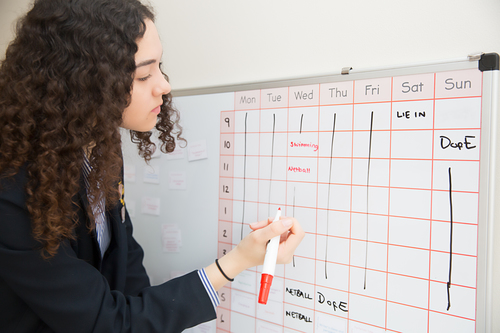5 practical tips for managing exam related anxiety
Nathan McGurl, founder of GCSE revision aid The Study Buddy, shares his expert advice on how to combat exam stress and get the best out your revision time.
5 practical tips for managing exam related anxiety
The countdown to GCSEs is well underway, and students across the country are starting to feel the pressure. But while it’s natural to feel anxious about looming exams, it’s important not to let these feelings spiral out of control.
Concerningly, 80 per cent of young people have reported exam pressure has significantly impacted on their mental health.
It’s common for young people to use unhelpful strategies to deal with feelings of anxiety – whether that’s putting off revision because it feels too scary to think about, or studying around the clock to cram everything in.
The important thing is to use your time effectively, rather than equating time spent in front of your books as being time well spent. A well thought through plan can reduce levels of anxiety, giving students – and parents – a clear sense of purpose. Not knowing where to start is one of the things that leads to feeling out of control and that can result in anxiety or simply giving up.
1 . Break it down
Sometimes staring into a really big task can seem really overwhelming. When we can’t see past the enormity of it all, can start to feel unachievable. But, there’s a simple trick to tackling any big project: look at it like a collection of smaller tasks.
The Study Buddy approach is to break your subjects down into bite-sized chunks instead of looking at them as a whole – so for example, ‘Enzymes’ is a far more manageable sounding task than ‘biology’.
Your school may provide revision guides which allow you to do this easily, or you can use the contents page of your textbooks. We recommend turning the units in to a set of flash cards which becomes your visual ‘to do’ pile. Once you’ve broken down the subjects into smaller tasks, they become much easier to fit around other things in your life.
2. Set short, achievable goals
Try not to focus on the scary end point of the exam itself. The Study Buddy approach recommends working to a weekly cycle, and allocating your bitesize chunks of revision into the time you have available. At the start of each week, decide what you are going to cover and when – ensuring you cover a mix of subjects, rather than leaving the ones you feel least confident in until last.
Celebrate little wins as you go - perhaps you’ve nailed osmosis, or got river processes down. At the end of each week, review how many units have moved from the “to do” into “done” pile.
An hour is a good amount of time to spend on a unit – but in reality, it’s very difficult to achieve 60 pure minutes of concentration. We advise that in any one hour you allow about 45-50 minutes study time. That gives a bit of time to get up, get a drink or check the phone. If you feel like you’ve smashed a unit after the hour is up - great, it can go to the ‘done’ list. If not, no problem – simply put it back on your ‘to do’ list to be revisited later.
3.Review and monitor regularly
At the end of each week, spend some time reviewing what is working well and what needs to be adapted. If you haven’t achieved everything you wanted to, don’t beat yourself up - this is no time to be judgemental if things haven’t happened exactly as they should have. Anything that wasn’t done simply returns to the ‘to do’ list.
It’s important to look for root causes. Is there something that should be changed for next week? Perhaps energy is low on Wednesdays, in which case don’t schedule revision for then. It won’t always be necessary to adapt the plan, sometimes we just have a bad day!
4.Allow for down time
If you’re feeling anxious about your exams, it’s common to experience guilt about taking breaks from studying. However, devoting every spare hour to revision is likely to make your anxiety worse. Our brains aren’t designed to absorb information for hours on end.
Mental well-being is reliant on having a good balance, so ensure that your revision plan factors in time with your friends and doing things that you enjoy.
5.Don’t compare yourself with others
Everyone will have a slightly different way to approaching exam preparation. While it can be helpful to share revision tips, remember to focus on what works for you. Some people find background music helps them to revise, while others need total silence. Some people find being tested helps them to consolidate what they’ve learned, but if this increases your anxiety it may not be the best tactic for you. The important thing to remember is that you are the one in control!
For more tips on how to revise effectively and reduce anxiety, visit
Study Buddy
About Nathan McGurl
Nathan McGurl is the founder of The Study Buddy, an approach to exam preparation based around the principles of agile project management.
Originally designed as way to help his teenage son Jake cope with GCSE revision pressure, The Study Buddy is a visual, ‘back to basics’ task management tool which is designed to reduce anxiety and increase confidence. To learn more visitStudy Buddy
For further information or product samples please contact Greg Halse or Holly Thatcher on 0117 905 1177 or greg@ambitiouspr.co.uk or holly@ambitiouspr.co.uk
This press release was distributed by ResponseSource Press Release Wire on behalf of Ambitious PR in the following categories: Children & Teenagers, Women's Interest & Beauty, Education & Human Resources, for more information visit https://pressreleasewire.responsesource.com/about.
